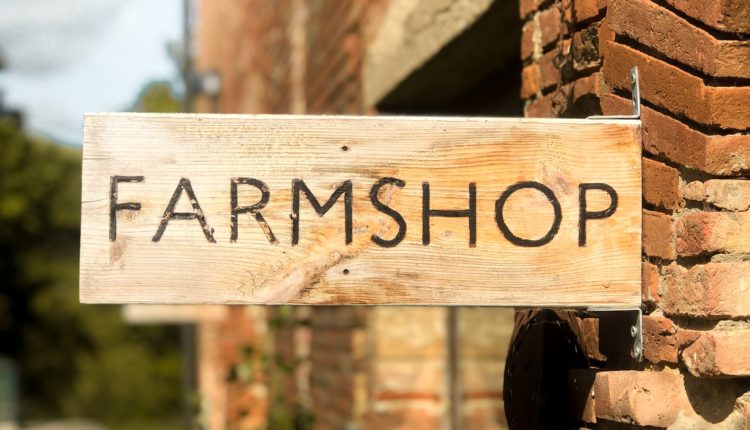Farm shop boom set for 2021 as government awards farmers £21m in grants and Brexit phases out direct payments
If you have ever dreamed of opening up your own farm shop, 2021 could be your year. Farm shops are opening at a faster rate than ever and farmers’ markets are proving a great way for producers to test the retail water without a large capital commitment, according to Gareth Jones of FARMA, the National Farmers’ Retail and Markets Association.
According to Jones who spoke to Farmer’s Weekly, farm shops are growing in popularity for budding rural entrepreneurs because they come in all shapes and sizes. However, the most sustainable at the moment are those offering what is known as a ‘full basket shop’, which would include all the ingredients for a good wholesome meal, thereby making the journey for customers worthwhile.
Jones said in the report that not all retail buildings will need planning permission. For example, if you are selling predominatley your own fresh produce – at least 90% – then you do not need planning permission to sell in a suitable existing building.
But it is always wise to never assume anything and to write to your local authority outlining what you propose to create and get a ruling from them, advises Mr Jones. He adds that planning permission may have a few caveats.
Farm shops that will need planning permission include those that intend to sell anything that has been processed, including meat and poultry (which are not regarded as fresh produce).
For more practical tips on opening up your own farm shop check out Startup Donut, which outlines things to consider, such as market research and legal stuff.
£21m in grants
The news of farm shop and farmer’s market popularity comes on the heels of more than 3,800 farmers set to benefit from £21 million in productivity-boosting equipment from the third and final round of the government’s Countryside Productivity Small Grants (CPSG) scheme, it was reported this week.
The Rural Payments Agency notified successful applicants of their awards in late November and is now encouraging farmers to speak to their suppliers to confirm the items they wish to order are available before accepting their grant by using the acceptance portal by 18 January 2021.
Under the scheme, farmers applied for grants of between £3,000 and £12,000 to invest in new and innovative equipment – from livestock monitoring cameras to precision farming technology – which help businesses save time and money and improve productivity.
Applicants have until midnight on the 31 May 2021 to buy and install all their items, and submit their claim for payment. This deadline has been extended by two months to allow for potential delays caused by the impacts of the coronavirus pandemic.
To date, £60 million has been allocated to farmers investing in technology to boost their productivity since the scheme opened in 2018.
It’s great to see that funding for all the eligible applications is being made for round three of this popular scheme. I would encourage all our customers to contact their suppliers early to ensure their items can be delivered ahead of the claim deadline.
Paul Caldwell, Rural Payments Agency Chief Executive
Although the CPSG scheme is closing, government support for the investment in technology will continue as outlined in the Agricultural Transition Plan, said the government. As part of this, the government set out plans for the Farming Investment Fund which will support innovation and productivity. The fund will provide targeted support to businesses so that they can invest in equipment, technology, and infrastructure that will improve their productivity and deliver environmental and other public benefits.
There will be two levels of the Farming Investment Fund:
- Farming Equipment and Technology Fund, which will offer small grants to contribute towards the purchase of a list of specified items
- Farming Transformation Fund, which will provide larger grants towards the cost of more substantial investments in equipment, technology or infrastructure, with the potential to transform business performance.
More information on the Countryside Productivity Small Grants scheme can be found here.
Direct Payments
“The Direct Payments currently made through the Basic Payment Scheme offer poor value for money, reward those with most land, inflate rents and stand in the way of new entrants,” said the Department for Environment, Food & Rural Affairs. “The savings from phasing out these untargeted payments will free up more of the agricultural budget, which will go back to farmers through the roll-out of Environmental Land Management scheme, and the introduction of schemes to help farmers to boost their productivity.
The Direct Payments will be reduced over the next four years, with the biggest reductions made to the higher payment bands. Further reductions will be applied until the last payments are made in 2027.
In order to ensure that farmers are adequately supported throughout this journey, farming resilience programme will be made available throughout the first three years of the agricultural transition period to help those most affected by the phasing out of Direct Payments. This will help farmers plan and manage their businesses through the transition to the new system.
The document also sets out the various steps that have been taken to simplify the Basic Payment Scheme for next year, in order to reduce the burden on farmers as they focus on transitioning to the new system. This includes important changes to cross-compliance, such as an increased use of warning letters and offers of advice over farmers receiving a penalty as the default response to a breach of the rules.



